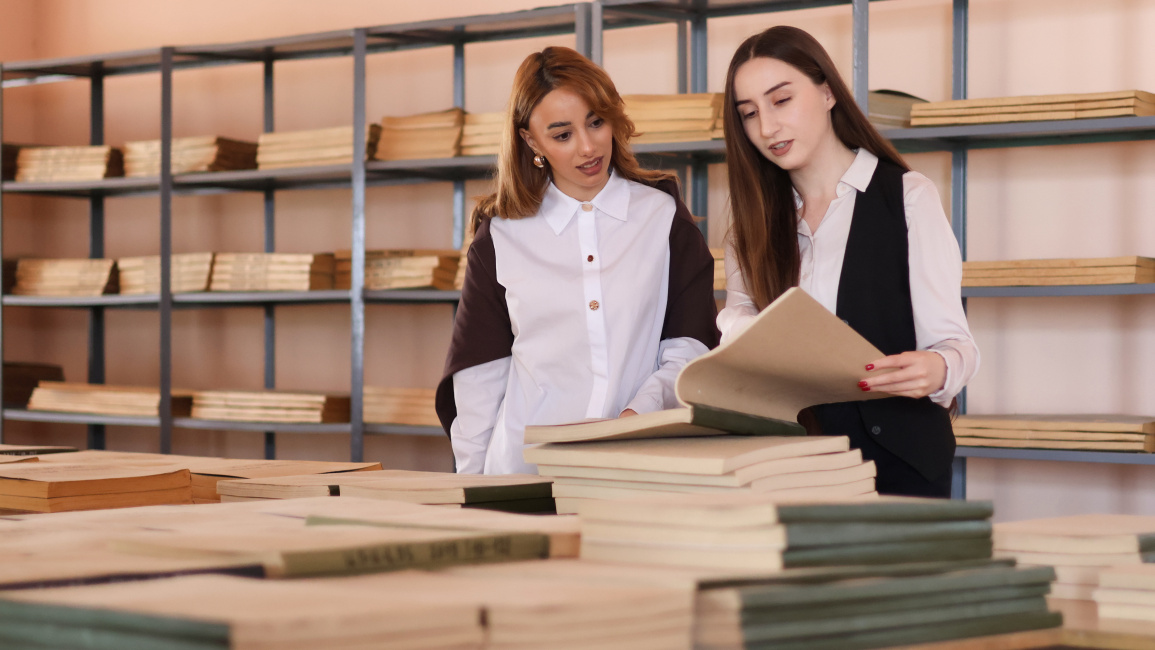November 11, 2025 | 16:10
Science
Research
Competitions
YSU PhD student studies press development amid global changes
Marine Mkrtchyan, a PhD student at the Chair of History, Theory, and Practice of Journalism of the YSU Faculty of Journalism, is one of the winners of the "Research Assistance Program for Young Applicants and PhD Students–2025," announced by the Higher Education and Science Committee of RA MoESCS. Her research aims to uncover the patterns of press development, with a focus on the impact of digital technologies, social media, and evolving information consumption practices.

– How did you react when you learned that your research project had been selected for funding?
– I first heard the news from my faculty lecturer, Taron Danielyan, but at the same time, I was scanning the list of winners myself. When I found my name, I exclaimed aloud, 'I can't believe it,' even though faith has always been the foundation of all my achievements. "Faith is the assurance of things hoped for, the conviction of things not seen" (Hebrews 11:1). In a sense, being among the winners was expected—I believed it would happen.
– What is the purpose of studying press transformations in the early 21st century?
– I am interested in how the press evolves and responds to global changes. Particularly in the early 21st century, the press has undergone (and continues to undergo) transformations largely driven by the rise of digital technologies, unprecedented growth of social media, and shifts in information consumption culture and other factors. Although there is a substantial body of scholarly work addressing the transformations of online periodicals, a comprehensive analysis of the topic is still lacking.
I often thought about what would happen if I undertook the study myself. Together with my research supervisor, Professor David Petrosyan, Head of the Chair of History, Theory, and Practice of Journalism, we chose the research topic: "Press Transformations in the Early 21st Century: A Case Study of Armenian and British Online Periodicals." We decided to analyze the changes in press development using examples from Armenian and British online publications, to identify emerging patterns, similarities and differences, and to uncover functional transformations of the press within both national and global contexts.
– Why did you choose Armenian and British online periodicals for comparison?

– The British press, as one of the world's leading media systems, has an extensive experience with a long-standing tradition, highly developed professional skills, and innovative approaches. Its influence is evident in the international media landscape, and online periodicals often shape global development trends. While the Armenian press is also engaged in these international processes, the transformations of Armenian online publications have not yet been comprehensively studied. This gap is especially significant when conducting a comparative analysis between the media landscapes of the two countries. This study will enable the development of a theoretical model of press transformation in the digital age and reveal the specific features of Armenian and British online media development, offering practical recommendations for the sustainable growth of digital press in smaller markets.
– What significance does this research hold for the development of Armenian journalism? How could your findings be useful for media professionals in Armenia?
– Essentially, the research results can be useful in several ways. First, they will enrich and expand the scholarly literature on contemporary media transformation practices. Second, by providing extensive empirical material, they can create a platform for collaboration among specialists across different fields to conduct multidimensional studies of media transformation in the digital environment. More broadly, the research will facilitate collaboration with international research group(s) interested in the topic, encouraging the participation of Armenian media scholars in the global academic community.
Practically, these findings can help media policymakers and editorial teams in making better-informed decisions, developing new strategies, and implementing programmatic policies.
– In your view, what is the most striking trend in global press transformations?
– When speaking about the global press, one must consider a media landscape that transcends national or regional boundaries. Therefore, transformations in the global press are not one-sided and determined by a single factor. Digital technologies, social media, audience demands, local developments, and many other processes together shape the changes we see. Consequently, it is difficult to single out one "most striking" trend; rather, it is the cumulative effect of multiple, layered processes, each contributing to the overall transformation.
– What research methods are you employing? Content analysis, comparative methods, or a combination?

– To ensure a comprehensive analysis and the reliability of the results, the research employs a combination of methods. Systematic, historical, and comparative approaches are applied to examine the structure, development stages, and specific features of British and Armenian online periodicals. Empirical work includes both quantitative and qualitative content analysis, discourse analysis, and expert interviews. Together, these methods allow for a full depiction of how British and Armenian online periodicals are evolving, the transformations taking place, and the significant patterns that can be identified.
– How long is the research expected to take, and what stage is it at currently?
– The research is planned for three years and is being conducted in a phased, systematic approach. Currently, we are developing the theoretical and methodological framework and selecting target publications. Subsequently, we will analyze the content and structural-functional characteristics of the selected British and Armenian online publications. The final stage will involve comparative analysis, resulting in a comprehensive understanding of press transformations in the two countries.
– How important do you think such competitions are for encouraging young researchers?
– You know, thinking about this question, I realized that such competitions encourage not only the winners. When I was a third-year student working as a journalist covering university life, I often interviewed previous winners of this competition. Speaking with them sparked my own interest in science. Imagine people only a few years older than you conducting studies, publishing in reputable journals, and sharing their experiences with such enthusiasm! Seeing their experience, I often asked myself why I could not be one of them. (she smiles)
Now, as a winner, I can confidently say that these programs genuinely motivate young researchers, validating that their efforts and research ideas are important. The funding provided for bringing these projects to life serves as a pleasant incentive to work within clear deadlines, stay focused on the research, and achieve tangible results.

